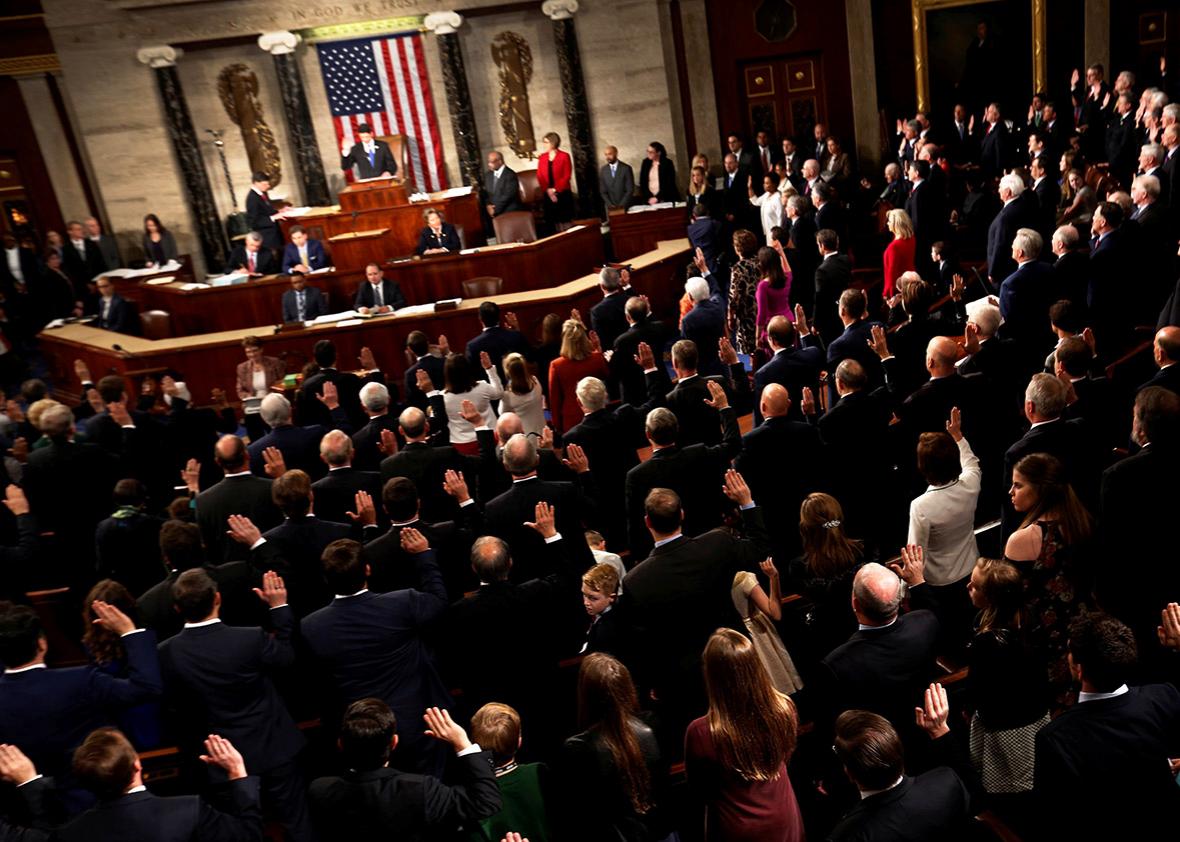To inaugurate their new era of unified right-wing control, House Republicans made a surprising (but not unprecedented) choice: They gutted the Office of Congressional Ethics, a bipartisan and independent institution meant to investigate wrongdoing by members of the House. Established in 2008, it was a response to the ethics scandals that plagued the chamber under former Speaker Dennis Hastert and Majority Leader Tom DeLay, which included everything from the influence-peddling of lobbyist Jack Abramoff to the sexual predation of Florida Rep. Mark Foley. Crafted and passed by Democrats, it was nonetheless bolstered by GOP leader and later Speaker John Boehner.
But that was before Donald Trump gave the party a chance to pass its far-reaching agenda. And with that opportunity on the table, congressional Republicans surfaced a play last used in 2005, when they had unified control under President George W. Bush—they attacked ethics rules. What unfolded thereafter was an illuminating exercise in one kind of shamelessness being trumped by another, higher shamelessness.
On Monday evening, Virginia Rep. Robert Goodlatte announced that the House Republican Conference had approved a move to weaken the OCE without notice or debate. The change would place the independent investigative body under the partisan auspices of the House Ethics Committee, which would have the authority to end any OCE probe. At the same time, under the new rules, the OCE could not employ a spokesperson, investigate anonymous tips, or refer criminal wrongdoing to prosecutors without authorization from the Ethics Committee.
This produced some noisy blowback. House Speaker Paul Ryan immediately tried to distance himself, with public reports loudly proclaiming his opposition to the amendment. Democratic lawmakers and watchdog groups blasted Republicans and encouraged voters to contact their congresspeople. Donald Trump called the OCE “unfair” but criticized House Republicans for tackling the issue now, rather than later. Portrayed as substantive opposition by news media, this increased the pressure on Republicans. By Tuesday afternoon, facing a swift reaction from the public and the media, House Republicans had backed away from the amendment, tabling the measure for a later day.
Between the announcement and the response, we witnessed a rush of activity and an embarrassing setback for GOP lawmakers. We also learned something not just about the power of public pressure, but also about the likely approach and priorities of the House Republican majority, and Trump’s relationship to both.
For as much as the president-elect seems to have defied political gravity—winning elections even as he holds low ratings from most Americans—its laws still obtain. Unpopular actions are still unpopular. What the public thinks matters. That the House saw an immediate backlash to its action against the OCE likely influenced Trump’s tweets, which distanced himself from the GOP amendment even if he didn’t disavow the aim of the move itself. We should pay close attention to Trump’s reaction; it is a sign, perhaps, that his opportunism extends to Congress, and that he’ll throw his presumed allies under the bus if it will bolster his personal standing.
Given Republican actions over the last 24 hours, there’s a chance he’ll have plenty of opportunities to do just that. One defining feature of the modern Republican Party is its relentless drive for political advantage, even if it means defying longstanding norms and institutions. Scott Walker didn’t campaign against public employee unions during his 2010 gubernatorial run. But his first major act as governor of Wisconsin, backed by a new Republican majority, was to strip those workers of their collective bargaining rights: a surprise move meant to cripple the state Democratic Party.
For a more recent example, look at the events that followed the North Carolina gubernatorial election. In the wake of Pat McCrory’s defeat, North Carolina Republicans held an emergency session of the legislature where they stripped critical powers from the governor’s office: a nullification effort meant to keep Democrats from reversing McCrory-era changes to the state. Facing sustained criticism, they ejected journalists and observers from the legislative chamber.
The move against the Office of Congressional Ethics fits this pattern. No one campaigned on weaker ethics rules, but at first opportunity, Republicans went on the attack. They retreated, but that doesn’t mean they won’t try again. Worse, it serves as confirmation that House Republicans will approach Trump with a light touch despite his deep conflicts of interest and history of corruption. There’s a real chance that Trump will violate the Emoulments Clause of the Constitution upon taking office, but that means something only if Congress is willing to investigate him and his behavior. That Republicans made their first move against an independent ethics office is a good sign that Trump is in the clear.
Which means that, for opponents of Trump, they can’t count on Congress to act of its own accord. They will need to take advantage of his unpopularity and make Trump’s entanglements an issue and a liability for his administration. Against a president who elevates shamelessness to an art form, and a Congress in the grip of ideological fervor, it’s the only kind of pressure that may work.
